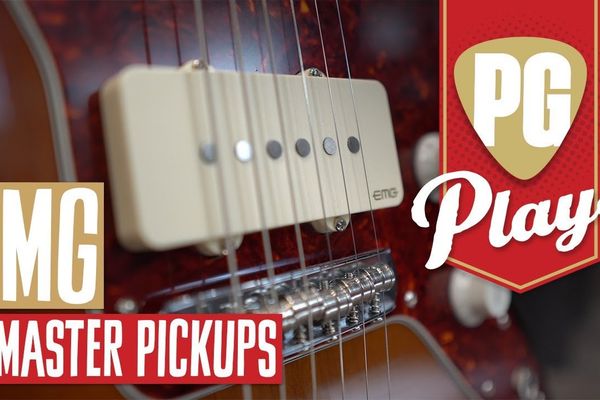Don''t let airline damage happen to you!
 |
In one month, airlines savagely ravaged two great guitars of mine. The first experience was a standard acoustic fly date. I usually fly my Takamine; it''s a great, utilitarian guitar that sounds amazing direct and I know if it is destroyed or stolen I can buy a nearly identical replacement almost anywhere. The artist I was working with really loves this old Gibson J100 of mine so I obligingly brought it instead. I carried it on the first flight but was forced to check it on the return. Sure enough, when I opened the case in Nashville, there was a split in the top. I don''t know what caused it; maybe it was just due to happen, but I can''t help but surmise that the abuse of the flight quickened this break down.
The second and more painful experience happened later in the month when I was gigging up in Bozeman, Montana and stumbled into a store called Music Villa where I found a 1969 Gibson 340, completely original in amazing condition. This serendipitous find falls within the two most coveted, magic years – Larry Carlton plays ‘68 and ‘69 335s. The 340, though it retailed for more than the 335 when new and is basically the same guitar with a different wiring harness, can be bought for considerably less, but still more than a minimum wage kid like yours truly can afford. Unbelievably, the store owner gave me a great deal. (And that''s why I love a good, old mom-and-pop business.) The only little cloud hovering over my transaction was the looming task of transporting this gem home safely. The J100 break had made me a bit paranoid; you know what they say: just because you are paranoid doesn''t mean they''re not out to get you. Along with the 340, I had to fly a Tele and a pedal board home, which doesn''t really bother me. I rebuild my travel board so often because of flight abuse that the process has grown routine. The Tele is just a couple of planks bolted together, so while not completely indestructible, it''s pretty close. I''ve gotten to the point where I always check that gear and try to only fight battles that are really important.
In our post-9/11 world, one is hard pressed to carry a larger, hard case guitar on the plane. In the past, I''ve begged with airlines to no avail then watched from my seat as the chuckers gleefully toss my guitar in the hull of the plane. I decided to box up the 340 with lots of padding and hope for the best. The outcome: Northwest Airlines beat the shit out of this guitar. They jacked the neck and the top took a hit. This guitar had survived thirty-nine years with only a little beautiful weather checking. In one trip Northworst painted a mustache on Mona Lisa.
On Monday I loaded up $7000 worth of broken guitars into my $800 car and brought them to my go-to guys. Gibson Repairs and Restoration in Nashville has been flawlessly patching my poor guitars back together for years. The manager Todd Money, shop manager Timothy Tucker and rock demi-god Dion Edge really are like magicians when it comes to repairs. While I was in their shop cursing the sad lot of those forced to fly guitars, I asked if they had any preventative measures that could keep me out of their shop. Here''s a few of their and my tips which could save your neck:
- Remove anything heavy from the small compartment inside the case. On a recent flight from Tennessee to California I carefully tucked a tuner and an overdrive in this compartment in my Tele case; when I opened the case at the gig, the bag searchers had taken everything out of that small compartment and left it banging against the neck for two thousand miles. Nice.
- Loosen your strings. Todd suggests loosening your strings at least one full step, but not so much that the bridge or saddle can work itself loose in transit and damage the guitar. I usually just drop both E stings flat to make the retune that much quicker.
- Use an ATA-approved flight case. I don''t have one now, but I''m seriously considering making the investment. I used to always carry my two electrics in a double gig bag, but I''ve been forced to gate check these on two nerve-wracking flights. When I find a double ATA case that weighs less than 50 pounds loaded, I''ll buy it. If anybody knows of one, please tell me!
- Open your case as soon as you arrive to make sure your baby is home safe. A friend of mine, Pat Seavers, had his 1966 Strat stolen out of its case at Heathrow. A Red-Cap picked up his Strat case along with the rest of the band’s gear, loaded it into vans and brought everything to the venue. Hours later when the guitar tech opened the unusually light case, his Strat was already in the hands of some luggage monkey with a bad British smile.
- Ship the guitar. When shipping a guitar, make it quick; two days air is the safest. Never go ground: more time in a truck means more time for damage. Avoid sending anything on a weekend: you don''t want your guitar spending a Saturday or Sunday in a very hot or very cold environment. Insure for the full value. If you''ve insured a guitar for $5000 or more, a UPS supervisor will personally check on your guitar every step of the way. Todd and Timothy use these basic rules with FedEx and have very few problems. Todd estimates six claims a year out of a thousand shipments.
For more on traveling with your axe, check out our air travel podcast. Click here to download.
John''s new book, Guitar and a Pen, has just been published by a division of Warner Books and is available at Amazon.
John Bohlinger is a Montana native and former Ivy Leaguer who was close to earning a Ph.D. in psychology when he dropped out to pursue a life in music. "The psych background comes in handy when dealing with the music business" John quips. Over his fifteen years in Nashville, John has toured the world, holding down the guitar/mandolin/pedal steel end for over 30 major label artists; he currently leads the band for the hit show Nashville Star, which has moved to NBC. John''s songs and playing can be heard in several major motion pictures, major label releases and literally hundreds of television drops. For more info visit johnbohlinger.com



